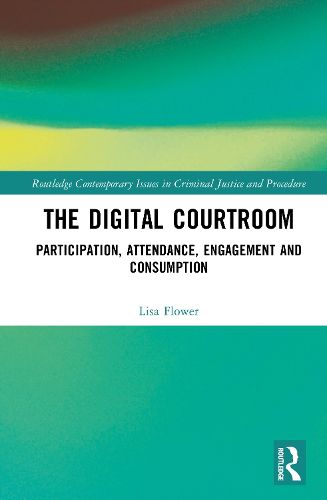Readings Newsletter
Become a Readings Member to make your shopping experience even easier.
Sign in or sign up for free!
You’re not far away from qualifying for FREE standard shipping within Australia
You’ve qualified for FREE standard shipping within Australia
The cart is loading…






The digitalisation of courtrooms brings both opportunities and challenges to the judicial process, shaping our understandings of trials and their participants in a myriad of, at times, unexpected ways, and transforming how we participate in, attend, engage with, and consume trials. While digital tools offer potential benefits, they can also impact core aspects of judicial integrity, such as the conduct of legal proceedings and participants' experiences, as well as introducing additional layers of complexity - sometimes problematic - in how trials are portrayed in popular culture. By exploring these developments, the book highlights the importance of a thoughtful approach to digital integration - one that carefully considers its implications for procedural fairness, public trust, and the perceived legitimacy of the legal system. The author examines the social construction of courts in the digital age and argues that digitalisation is not merely transforming the tools of justice but is redefining the very essence of the justice experience and transforming our perceptions of trials and their participants. The work will be a valuable resource for scholars and students in the social sciences, law and all those interested in digitalisation and society. The Open Access version of this book, available at www.taylorfrancis.com, has been made available under a Creative Commons Attribution (CC-BY) 4.0 license.
$9.00 standard shipping within Australia
FREE standard shipping within Australia for orders over $100.00
Express & International shipping calculated at checkout
The digitalisation of courtrooms brings both opportunities and challenges to the judicial process, shaping our understandings of trials and their participants in a myriad of, at times, unexpected ways, and transforming how we participate in, attend, engage with, and consume trials. While digital tools offer potential benefits, they can also impact core aspects of judicial integrity, such as the conduct of legal proceedings and participants' experiences, as well as introducing additional layers of complexity - sometimes problematic - in how trials are portrayed in popular culture. By exploring these developments, the book highlights the importance of a thoughtful approach to digital integration - one that carefully considers its implications for procedural fairness, public trust, and the perceived legitimacy of the legal system. The author examines the social construction of courts in the digital age and argues that digitalisation is not merely transforming the tools of justice but is redefining the very essence of the justice experience and transforming our perceptions of trials and their participants. The work will be a valuable resource for scholars and students in the social sciences, law and all those interested in digitalisation and society. The Open Access version of this book, available at www.taylorfrancis.com, has been made available under a Creative Commons Attribution (CC-BY) 4.0 license.